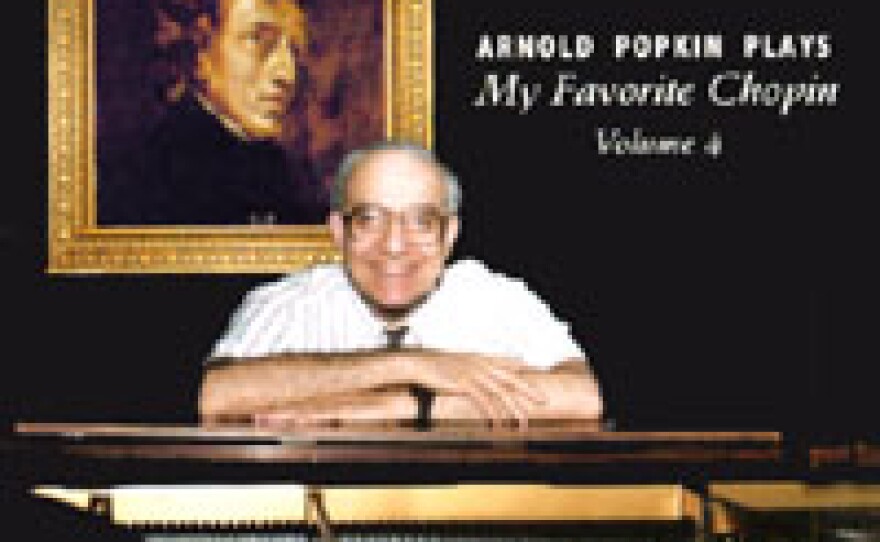Many of us celebrate a birthday with a meal out at a favorite restaurant, or a party with cake and presents. But retired Charlottesville ophthalmologist Arnold Popkin will celebrate his birthday by playing a concert at Charlottesville’s First Presbyterian Church on Sunday afternoon. WMRA’s Kimberlea Daggy has more.
[Popkin playing piano fades in]
Dr. Arnold Popkin has played piano since he was three years old, and there’s no sign of him stopping anytime soon.
DR. ARNOLD POPKIN: Gonna be 80, still in reasonably good health, and for the fact that I could still play the piano about as well, or maybe even better than I ever did before, so that was the strong feeling of gratitude that started it. Then I said, maybe I ought to do a big concert in honor of this occasion.
He’ll play this concert, as he has in the past, entirely from memory.
POPKIN: I always play solo music by memory. Memory’s always the one thing everybody’s scared of, but I think that if you don’t play by memory, you don’t really know it and it’s less distraction. I’d like to feel that when I’m playing, I’m actually composing the piece almost as I do it. It’s like coming out of me.
And after 70 years of playing, Popkin is not playing it safe.
POPKIN: Chopin has always been my favorite composer. I play him well, I’ve been told, and a lot of audiences love Chopin. And I ended up selecting 11 pieces. And I tried to put things together that would be the right timing and the right one to follow the others. Basically I picked three or four of the slower, lyrical pieces and I used those to follow a more advanced, faster, dramatic piece.
Popkin began playing pieces by Chopin at the age of eight and he’s just as enamored with the Polish composer today as he was 70 years ago.
POPKIN: Chopin is really an amazing composer. He combines so many things. First of all, he writes beautiful melodies and lyrical music. His rhythms are interesting. Three of the pieces I’m playing are actually dance forms – a mazurka, a polonaise and a waltz, as different rhythms. Some of the big pieces have a lot of drama and emotion and feeling in them. And he seems to have lasted over the years, amazingly, since he died in, what, 1849. Some composers sort of go out of fashion and I don’t think he ever has.
Popkin seriously studied piano and participated in the first ever Van Cliburn International Amateur Piano Competition…
POPKIN: I did not advance to the highest round, but I got a wonderful write-up in the Fort Worth paper that said I played with rare interpretative intelligence, so I thought that was worth the whole thing.
But at that level, why not make a career out of it?
POPKIN: I was never a big practicer. I always hated technical exercises. And I knew at a fairly young age, even though I was quite a good pianist, that it was not going to be a career. When I was maybe 10 or 12, the word “balance” was my key word in life. And I knew that I didn’t have the personality or the drive to become a concert pianist. I wouldn’t like practicing six or eight hours a day and having little opportunity to do anything else.
KIMBERLEA: So why did you choose ophthalmology?
POPKIN: Well, I chose medicine first and it was not until my last year of medical school that I switched what I thought I was going to do and go into internal medicine. I had some wonderful lectures in ophthalmology and within about a month I switched and I have never regretted it.
The piano may have taken a back seat to ophthalmology, professionally speaking, but Popkin has continued to hone his piano skills.
POPKIN: The most important thing on the piano I think is voicing of the chords and notes. How to make the bright ones stand out and have the others all in the right proportion, and that’s something that you have to hear and feel.
KIMBERLEA: And different fingers are playing different volumes…
Exactly. That’s exactly what it is. So it’s like a quartet of singers. One has the melody and the others have to be just in the right proportion. And when it’s right, it’s just beautiful. I’ve always wondered, when you hear a super pianist, play a simple line of something, and it’s unbelievably gorgeous – what did they do? It’s very hard to figure out. You just know it and feel it.
Popkin will celebrate his 80th birthday by playing an all-Chopin concert at First Presbyterian Church in Charlottesville on Sunday afternoon at 3.
EDITOR'S NOTE: The Concert is free and open to the public.




